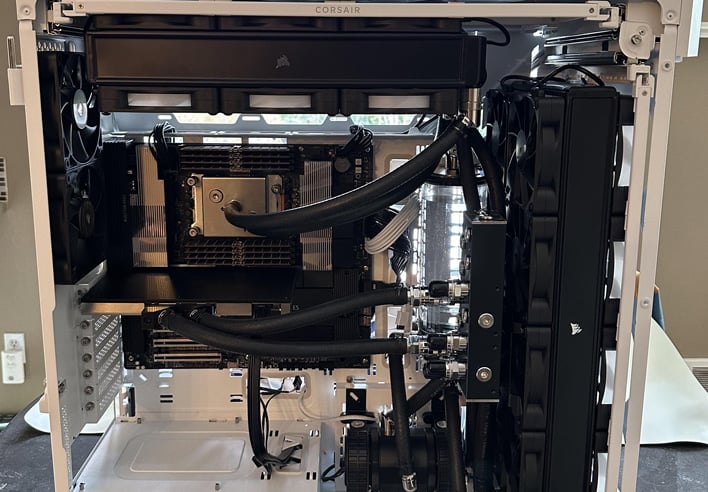$20,000 PC Build Nightmare Leaves DIY Builder Stuck After Failed BIOS Update
Reddit user joel_motion (Joel) has been fighting with his build for a total of seven (yes, 7) months now, with no apparent solution in sight. First off, the base specs: a big honkin' AMD Threadripper Pro 7975WX CPU sitting a top an Asus Pro WS WRTX90E-SAGE SE motherboard; not one but two Zotac Trinity RTX 4090 graphics cards; a total of 512 GB of RAM; a Silverstone HELA 2050R power supply; and a couple 4 TB NVMe SSDs. The CPU and graphics cards are cooled by a custom liquid-cooling loop, and all the goodies sit inside a Corsair 9000D full-tower case.
The tale kicked off in late 2024 when Joel assembled his machine outside the case, and then moved it inside. He reportedly had two successful boots, but then went on to update the motherboard's BIOS due to an incompatibility with one of his SSDs, using a non-descript "BIOS utility." Unfortunately, that was the last time the machine POSTed, as the BIOS update hung up, he had to shut the PC off, and the machine henceforth displayed a Q-Code 92 error, related to the PCI bus initialization.

Joel cleared the CMOS and used BIOS Flashback several times with different BIOS versions, and tried plugging in the machine without any drives or peripherals; all to no avail. You'd correctly reason that the BIOS was corrupt, and so did Joel. He sent the motherboard back to Asus for an RMA, got a refurbished unit back, but this didn't help matters. He then sent the mobo back a second time, and Asus returned it saying it was fine. Joel then proceeded to test and swap out GPUs, the CPU, the power supply (swapping it for an MSI unit), and the RAM (he tried only one stick of the smallest supported size). He even cajoled Asus into sending him a third motherboard, but none of this was of any help. If you're keeping track, every main component has now been replaced, and the machine is, as Joel calls it, the PC of Theseus.
As of this writing, Joel doesn't have a solution in hand for his seven-month ordeal, though fellow Redditors came up with a few suggestions. First and foremost, the Corsair 9000D case has a known manufacturing defect that can cause some machines to not boot, as it causes motherboards' power protection to inadvertently kick in. Maybe it's this simple for Joel's case. If that doesn't help, then other users have suggested to remove the PC from the case, as something could be shorting out, and double-check his standoffs. One user even suggested that the Q-Code 92 error might be temporary, as the motherboard would be in its RAM training process, an operation that is known to sometimes take 10 minutes or more in some cases.
Likewise, testing without the liquid-cooling setup might prove beneficial, for one reason that we considered from the get-go: the CPU might not be seated correctly, or the socket might not be getting even pressure, as HEDT chips like the Threadripper tend to be exceedingly finnicky about that, and even come with torque specs for the cooler mounting screws. Additional suggestions include ruling out external components like the keyboard and monitor, where a voltage fluctuation could cause the system to go haywire. Although arguably it's never been easier to physically build a PC, these rare tales are a harsh reminder that they're nevertheless extremely delicate and complex machines.

